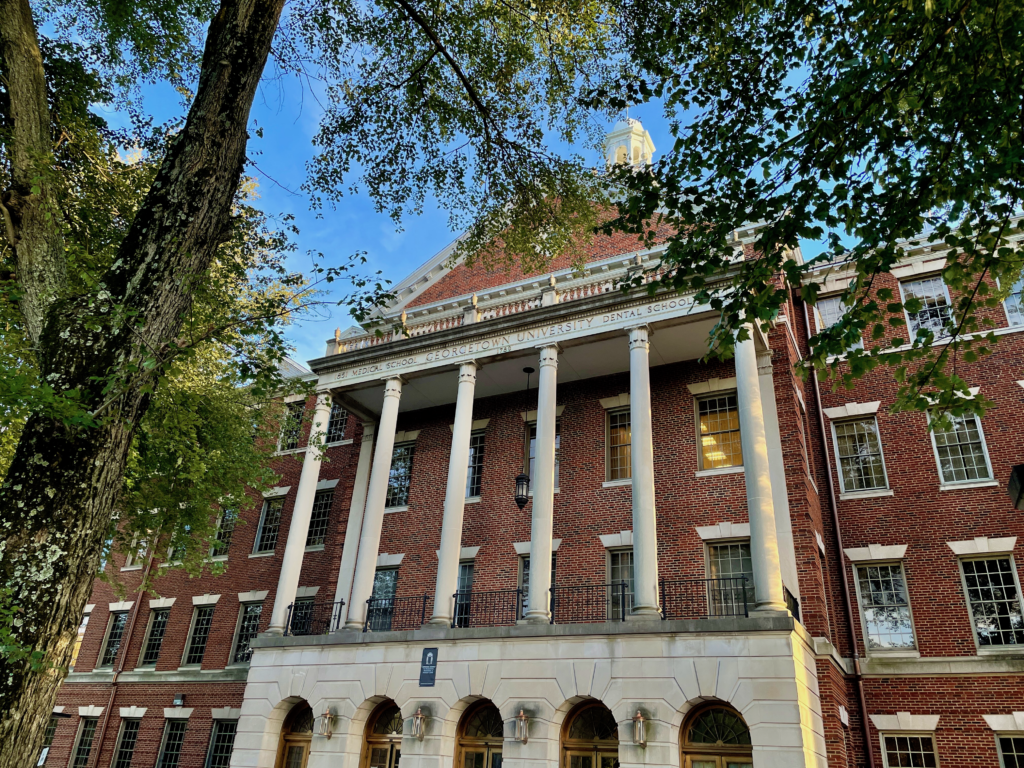A Georgetown University Medical Center professor is planning to develop a global health treaty to combat future pandemics after being awarded an international peace and security research grant.
Alexandra Phelan, assistant professor in the Microbiology and Immunology Department at the Georgetown University School of Medicine, received a $196,000 award from the Carnegie Corporation of New York, a philanthropic organization supporting educational programs around the world. Phelan also serves as an adjunct professor at the Georgetown University Law Center and a member of the Center for Global Health Science and Security.
The prize, announced on Sept. 8, was awarded to 10 other winners, with the corporation distributing a total of $3.6 million with the purpose of exploring more equitable solutions to international security issues, including the management of pandemics.
In conjunction with the Georgetown University Center for Global Health Science and Security, the project will aim to create a global pandemic treaty, a detailed set of guidelines and preparedness measures for countries across the world to follow in order for a more effective pandemic response in the wake of the COVID-19 pandemic, according to Phelan.
“Now we’ve got lots of these political leaders at the highest levels of government interested in pandemics and international law and we wanted to push this treaty,” Phelan said in a phone interview with The Hoya.
Countries across the world have called for codified international cooperation through a global pandemic treaty, which would ensure countries are held accountable to sharing information and technology with one another. One of the biggest challenges of the COVID-19 pandemic was the lack of sharing across borders, according to NPR, making these treaties an important next step in combating future pandemics.

The prize, announced on Sept. 8, was awarded to 10 other winners, with the corporation distributing $3.6 million in total with the purpose of exploring more equitable solutions to international security issues, including the management of pandemics.
For proposal submissions, the Carnegie Corporation of New York’s International Peace and Security program asked for unique management suggestions for future pandemics and their threats to global security after witnessing the difficulties that international relations experts faced with COVID-19.
“At the time, the international community was struggling to form a collective response to COVID-19, and the United States was wrestling to balance its role on the international stage with pressing domestic concerns,” the Carnegie Corporation of New York wrote in a Sept. 8 press release.
Out of more than 300 submissions, Phelan’s plan was selected. A central focus of the treaty is preparedness for future pandemics so that a global response can be coordinated quickly and effectively, according to Phelan.
“It’s about making sure that whatever pandemic treaty or whatever forms of international law do happen are not just informed by what the law currently is and what the science is, but are also going to make us more prepared for the next pandemic,” Phelan said.
According to Phelan, the Center for Global Health Science and Security is focused on building its knowledge with a broad network of experts in areas such as law, international relations, global health security and disease.
This project will improve international cooperation towards global health equity, according to Edward B. Healton, executive vice president for health sciences at the Medical Center and executive dean of the School of Medicine.
“The pandemic has underscored the interdependence of our nation’s health with the health of nations globally,” Healton wrote in an email to The Hoya. “Sustainable solutions will not come from any one discipline or any one approach, but from a variety of disciplines looking at solutions from all angles.”
With its capacity for research and location in the nation’s capital, Georgetown is the ideal institution for Phelan and her team to explore this project, according to Healton.
“As history has demonstrated time and again, the academic setting, especially like ours at Georgetown, provides the ideal incubator where meaningful ideas emerge and change occurs,” Healton wrote.
According to Phelan, a major achievement of the pandemic treaty would be creating a more equitable forum for countries to develop global health policy.
“One of the things we really wanted to make sure was part of this project is that we elevate voices from the Global South in these areas of expertise to bring their perspectives,” Phelan said. “International law has traditionally been very much driven by Western countries, high-income countries, and the pandemic has demonstrated not only the consequences of that but how there’s a lot more nuance to many of these issues, and this big risk that we engage in a form of neo-colonialism with the law-making that occurs out of this.”





















Shreya Dudeja • Sep 24, 2021 at 10:22 am
Loved this article! Very well written!